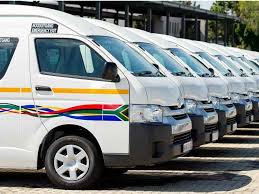South Africa is having a big problem with load shedding, but that doesn’t seem to be slowing down its move to green energy. Stellenbosch University (SU), which is run by the government, is testing what could be the country’s first electric taxis.
The cabs should be able to go up to 120 kilometers before they need to be charged again. They have an electric motor with 90 kWh of power and a battery with 53.76 kWh of storage.
A group of people from SU and Rham Equipment worked together to turn a minibus cab into one that runs on electricity. Right now, the car is being tested on the road, and performance testing is set to start right after.
One of the group members, Stephan Lacock, explained the process of change by saying that they got rid of the original internal combustion engine (ICE). The gas tank, the manual gearbox, the gas pipe, and the radiator were also taken off.
Then, with Rham Equipment’s support, the team constructed a “reproducible kit.” This kit contains the electric engine’s key components. They include a single-speed reduction gearbox, an electric motor, an inverter, a charger, and a computer control unit. The bus’s regenerative braking allows electric vehicles to expand their range when they slow down.
Read also: Possible EVS to launch first 100% electric taxis in Nigeria
South Africa is adopting clean transportation
As a long-term answer to climate change, many countries have switched to electric cars. The same is true for South Africa. Thinus Booyesen, a professor of industrial engineering at SU, said that electric taxis might already be made in the area. He says that more plants should be opened for this.
Booysen agreed that South Africa shouldn’t be slow to switch to electric vehicles. He says it could put thousands of people out of work. He also says that neither the government nor the car industry can “sleep at the wheel.”
“More than 70% of informal sector trips in South Africa are by minibus,” said Booysen. We want some of the country’s 250,000 minibusses to be refitted with electric propulsion. “These are cheaper and greener than new electric cars.
The professor wants to raise awareness of local electric car assembly talents with this project. He’s also considering how to inform South Africans about environmental impacts.
Possible EVs aims to introduce electric vehicles, for a greener Nigeria
How to handle a well-known energy problem
South Africa’s energy problem is well known, even though the country has grown so much. It hurt MTN’s market success in H1 2023 a lot.
Frequent blackouts hurt businesses of all sizes and make people doubt electric cars. How can South Africa charge electric cars every day if it doesn’t have steady power? This could ruin a weak power grid.
Even though Booyen acknowledged the energy issue, Johan Giliomee, a group member, stated that the taxis would use solar energy. He was talking about solar cells and batteries. He also brought up hydrogen.
Recently, Nigeria has attempted a clean transportation revolution. Last month, the government bought electric cars. A few weeks later, the government said it would buy 3,000 buses that run on compressed natural gas.
The main goal right away was to cut down on shipping costs and carbon emissions. This piece of writing gives advice on how to “execute smartly” these good plans.




